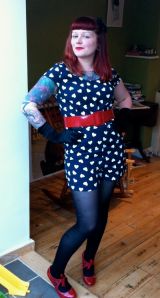After a long time in the reading, planning and thinking phase, I’m now in the early stages of my empirical research – I have been in contact with a small number of tattoo artists via email, and have had some amazing and interesting responses to my questions, inciting some exciting discussion and dialogue.
I am always really humbled when I receive responses within my research – people giving up their time to write to me, or talk to me about their experiences and sharing personal stories and opinions never ceases to inspire me and I am forever grateful.
The most recent response really stood out to me – this artist was the first artist to self identify herself as a feminist (in her email); and within her response it is clear that her feminism is really important to her, and a huge part of her identity. My next set of questions to her will be about her feminism, and how (if) it intersects with her art, her professional identity as a tattooer and her personal identity as a tattooed gender-queer (self identified) woman.
I was really excited by this for many reasons, but mainly I think because I too identify as a feminist and this is a huge part of whom I am, and what my research is about. But until now, I haven’t thought about talking directly to the participants about if they identify as feminists, and if they do, how this might affect their work as tattoo artists, and them as tattooed women.
When I think about this, it seems like a completely obvious subject to broach within my research and I’ve began contemplating why I haven’t thought about this before.
Surely feminism and tattoos lend themselves to one another? Reclaiming the body, subverting beauty norms, taking ownership, and creating an alternative identity – all feminist issues and ideals, right?
I myself am a feminist, carrying out ‘feminist research’ – I endeavor to ensure my research methodologies are feminist, so why aren’t I capturing this in the empirical research and the subject matter itself? Many of the participants talk about setting up women-friendly spaces, or all-women studios and negative attitudes to women tattooers. So why aren’t I asking a direct question about feminism and whether the artists think of these practices as Feminist?
One of my key themes within my research and literature review will be a discussion on feminist aesthetics and so my subsequent analysis of the data will no doubt include a link between these seemingly feminist practices carried out by the artists and feminism/feminist aesthetics. It now seems like a ludicrous and glaringly obvious omission to not ask the participants about feminism.
Perhaps I was avoiding the subject?
Perhaps I was avoiding the F word?
I wonder if I felt that striding on in there with the big ‘Are You A Feminist’ question might put people off taking part in my research? Not that I think it should, but more that I think there is a risk of this happening. Especially when you are conducting research via email – it is much more difficult to convey what you mean in a succinct and clear fashion. Talking face-to-face is easier in many respects and I hope to broaden my research with face-to-face interviews soon.
Are people put off by the word Feminist still? Or am I making presumptions because of personal experiences, recent media reports and comments in public on-line spaces?
Maybe my initial concerns were about ‘putting people off’ – but as a feminist, conducting feminist research, I should be embracing this challenge and striving to redress this issue within my work.
I am so inspired and relieved (!) to have received the latest participant email; the artist, in effect has given me ‘permission’ to talk directly about feminism with the research participants and I’m looking forward to the discussions ahead….
Please get in touch with your tales of feminism and tattoos!


